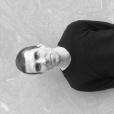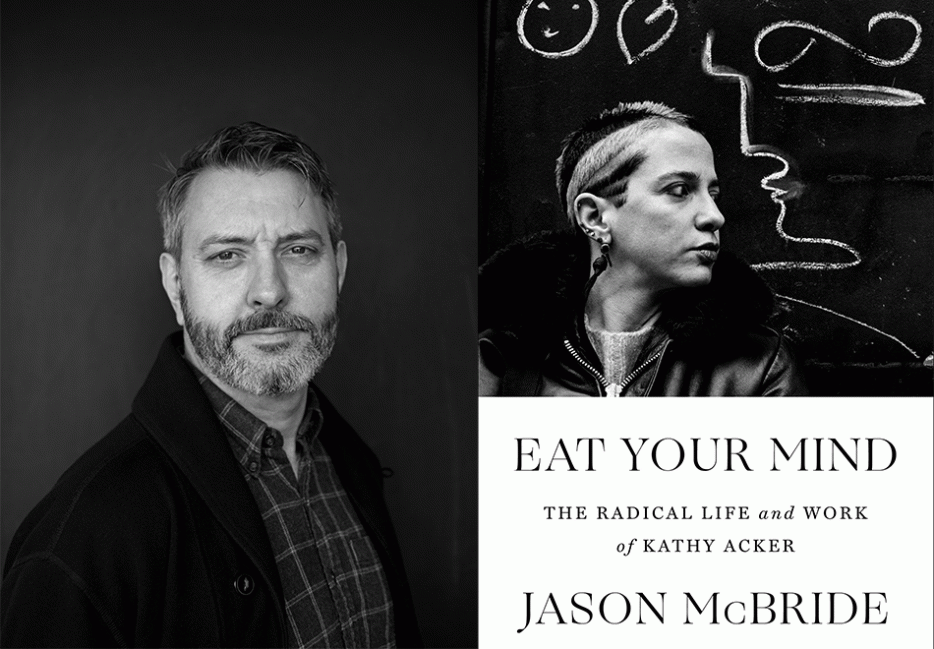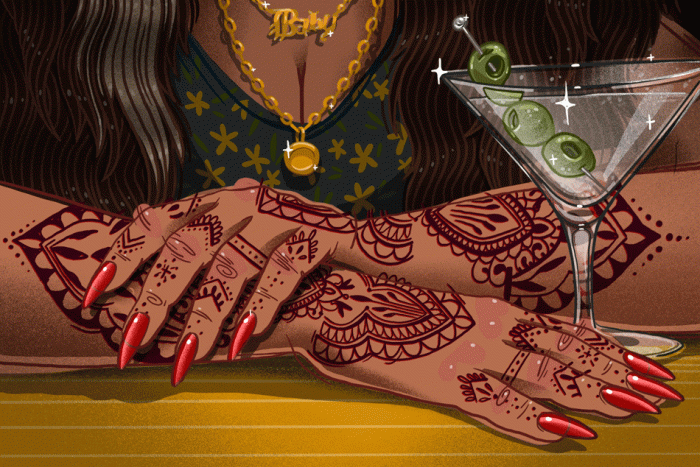By the time of her death at the age of fifty, Kathy Acker had lived several lives, concurrently, at least. She had renovated English language literary prose and its performance in ways that continue to encircle her best and weirdest successors, from shock tactician Audrey Szasz to “low theorist” McKenzie Wark. She had encountered, motivated, studied, and alienated hundreds of artists and personalities at the forefront of the experimental arts. And she had proposed a workshop of the body that transcends its typical employment in ways that are only now becoming commonplace, describing her own weight-lifting regimen as a place where “meaning approaches breath” and the artist stages a series of surmountable deaths. Mercurial, determined, needy, disputatious—the moods more so than seasons of Acker’s life were rapid, and any biography is bound to contradict and complement and hone the myths that continue to attract us to her writing and her symbol.
In Eat Your Mind: The Radical Life and Work of Kathy Acker (Simon & Schuster), journalist Jason McBride assumes this task with all the qualifications of a great reader. The first authorized biography to encompass Acker’s life and work, McBride’s book offers a grand tour of an improbably vast artistic existence; a scrupulously researched and revealed account in which Acker retains an outsized, vibrant presence amid conflicting portraits of her life and person. On occasion of the publication, I sat down with McBride to talk about his nearly ten-year pursuit of Kathy Acker and the continuing lessons of her many lives.
Cam Scott: In the preface, you describe hearing Kathy Acker read in 1988 as a pivotal experience in your own development. I’m curious, what was the moment in which you knew that you had to write about her life? I’d love to hear you sketch out a few key moments or encounters between hearing her perform and embarking on a project of this scope.
Jason McBride: I was obsessed with Kathy as a late teen and all through my twenties, and she passed away in 1997—almost a decade after I saw her. I spent a few years after that making films and fell into publishing and journalism. When I became a journalist in my mid-thirties or so, I managed to meet a lot of people who were part of Kathy’s circle, including Eileen Myles and Dennis Cooper, Dodie Bellamy, Kevin Killian, Bob Glück—I met them all in 2001. So I had superficial relationships with a large circle of people from different parts of Kathy’s life. After she passed away, I expected a biography to appear. What little I knew of her life was so fascinating, and I thought her work was so complex and spoke to so many things in the culture, I thought that naturally somebody was going to write a biography, it must happen. As a reader I waited and waited for that book to appear, and it never did.
Finally, after becoming a professional journalist and developing this relationship with her world, it occurred to me that if no one’s going to write this book—and I had asked around, I asked Kevin Killian and other people if anyone was working on something, but nothing seemed to appear—I could. I reached out to Matias Viegener, Kathy’s executor, in 2011 or so and said, this is who I am, this is what I do for a living, could we have a conversation about me possibly writing her biography. I assumed he would say no. Who am I to take on such a significant project? To my great surprise we talked for an hour, and he was extremely enthusiastic and encouraging, and we were off to the races. I think the first interview I did was with Kevin, auspiciously, in 2013 when he was in Toronto.
That’s a good omen.
It was. And you know what Kevin was like, he was so gracious and helpful, and he gave me a couple of books from Kathy’s library that she had given him years ago, as talismans to help me get on my way.
As you write, Acker’s life was almost impossibly rich in event; a lot of those events are associations and individuals, or sometimes intense and fractious relationships. Were there specific people or encounters who significantly changed the project, or relationships that deepened as you followed Kathy’s wake?
Aside from a couple of writers in the so-called downtown scene in New York like Lynne Tillman, or people in the New Narrative crowd like Bob Glück or Kevin and Dodie, I didn’t have connections to too many people; it was those two primary nodes. Those were expanded and deepened for sure; I met people like Gary Indiana who I didn’t really know before, Dennis who I’d known a little and had written about. But one of the most interesting things to me in writing the book, and something that I didn’t really intuit until I was immersed in the project, was Kathy’s connection to this whole cultural history of the avant-garde in the US, and to a certain extent the UK and Canada; her Zelig-like position in so many different worlds and circles. I talk about this ad nauseam in the book; she was a singular artist in herself, but this cultural history moved through her and she moved through it so relentlessly in life, it’s still astonishing to me.
Acker is heavily mythologized, and her novels are auto-mythologizing beyond believability as well. I feel that you take Acker seriously as a chronicler of her own experience: not as the final word, but as a better-than-unreliable narrator. I’m wondering, what are some of the advantages and disadvantages of taking up an overwritten, fictionalized life?
It’s a hard question to answer, and I struggled with it throughout the writing. I tried to take seriously her accounts of her life because I think that other people who have written about Kathy talk about her somewhat dismissively as being a fabricator or a liar. I think this really reduces what she was doing. Even though the evidence is not adequate to support her accounts—there are no letters from her mother to her father, there aren’t conventional biographical materials you would use to corroborate these accounts—biography is not a hard science, it’s an art. You’re writing a fiction in a certain sense.
The comic artist Alan Moore, who was a friend of Kathy, talked about her living in raw mythology; that was the way she lived her life. I think she saw herself in these mythic terms from a young age, and was certainly obsessed with classical mythology. The book doesn’t portray her as a mythic artist, but that was her understanding of herself, and a very unusual way for someone to live their life. Just representing that, capturing somebody living their life that way, is interesting to me. The veracity of it is not as important to me, but that someone saw themselves that way.
Perhaps this is my choice as a reader, but I related to her first in a confessional mode. There’s that key Freudian insight—that the difference between a real and a fantasized event is so often ambiguous.
I think it’s fair to read her work in that way. For ten years I was working on the book, and I feel like it should be one thousand pages. As you said earlier, her life is rich in event, but there are so many layers and planes. Now I’m confessing—I was so torn, I struggled with balancing biographical narrative with interpretation and criticism. It’s not a book of literary criticism, but I felt there had to be a fair bit of it for readers to understand the relationship of her life to the work. It’s a challenge throughout.
Another thing that I really appreciate is your intent to periodize Acker’s writing. Economic incentives and tectonic social developments underscore key decisions; and the reader receives a clear picture of Acker in history, coming of age against student movements on both coasts, and so on. I’m wondering, what do you think of Acker as a political commentator? You write about her caustic characterizations of the bourgeoisie, and I think you really draw out the social critic in her.
I think she saw herself as that for sure, and there are books that have been written much more expansively about that element. There are moments in her work when politics are ladled in as punctuation, ranting about Bush or Thatcher, but I think that she legitimately saw herself as a social and political critic, though not in a systematic way at all. Avital Ronell talks about how Kathy is an anti-systematic thinker, and I think that a lot of her political thought and commentary can be a little incoherent or repetitious; but the force of her political comments and those parts of her books are extremely effective. It’s not easy to characterize her politics.
Maybe an anti-authoritarian, even petulant, stance has a different valence in the culture wars of her day, where she’s antagonizing these strong master signifiers. But for someone who oscillates obscurity with celebrity, she gets away with a lot. There aren’t many encounters with the law.
It’s true, though there was intermittent trouble. She did run into censorship in the ’80s, in Canada and Germany. She was arrested a couple of times when she was younger, working in Times Square. But she did get away with a lot. I’m not sure if that’s just being a white woman of a certain affluence, and a celebrity to a degree. But at the height of her celebrity, she was in England, and felt by the end of her time there that she was going to get into trouble and that the law was going to clamp down on her at some point, especially after the Harold Robbins plagiarism lawsuit scare.
She was also extremely paranoid—that probably comes through in the book. She was paranoid that she was going to lose her homes, lose her status, her livelihood. And her paranoia grew as she got older, according to her friends, for a variety of reasons. And politically I think she was probably right to be paranoid, in a lot of ways. Especially when she returned to the US as the conservatism of the country was becoming more pronounced and dangerous to artists.
To speak of paranoia—I feel like there’s a tension in Acker between this classical desire, to be the lone firebrand, and this very modern kind of social genius, where the significant artist is someone who enacts a social constellation, or gives others something to work with. Maybe this corresponds to the different registers of her writing, but also to the worlds that she drifts in and out of.
It is interesting to think of that in terms of Kathy’s life and work, because there was so much contradiction in her life. There is a tension between being a solitary artist and the different collectives in which she moved; she really needed those. She was an interestingly social person, in that she really craved being with people and working with people, and then would retreat from that almost as soon as she entered those relationships. She needed both things so completely.
People complain on occasion that she was somewhat vampiric, but she needed these communities to draw from; and at the same time, she gave those communities so much, there was a give and take. In terms of her inspiration, in terms of helping people to get published, in terms of giving books to people. There were a lot of transactions—not transactions, exchanges—that were productive on both ends. It’s fascinating, because I think she saw herself as this lone genius, but she didn’t live her life like that.
In overview of all the people you’ve interviewed, I wonder if insofar as she’s a social genius, Kathy Acker is a novel, fulfilled in a project like this where you’re seeing it all at once. She must have intended that.
I think part of her did. Certainly she intended it a lot of the time. She liked people; she could have difficult relationships with her lovers and colleagues, but she did need people and liked people. She liked going to parties, she liked being at her club. She would resent certain parts of it, but who wouldn’t, really? One of the things that struck me, one of the surprises in writing the book, as I spoke to so many people about her; almost all of her friends were such generous, decent, kind people. To me. She had a really good group of friends over her life.
Now, these people might have been like that to me because they wanted to preserve Kathy’s legacy. They were thankful that I was doing this work and they wanted it to succeed, so they gave me their time and their memories and stories. That was a surprise to me, because I knew she had had these combative relationships with people, and I thought “this can’t be all one-sided, she must have had some people in her life who were not pleasant,” but I can only think of one. I won’t name names.
So many things have changed since you started on this path. I used to feel that Acker was a well-kept secret; I was gifted Blood and Guts in High School as teenage contraband, only now there’s this larger reception. I’m curious about your account of this renaissance of interest, and how that changed your research. There’s a public Acker now that wasn’t there when I was discovering her writing.
I felt that too. When I started the work, I say this at the end of the book, but I felt like she had been forgotten to a degree or was considered a bit dated or irrelevant. That was when I first started, but I think over time, and I’ll attribute a lot of this renaissance to Chris Kraus, whose star had risen over this time too—Chris writing her book about Kathy helped revive a lot of interest. There was a profile of Chris in The New Yorker while she was working on the book, so Kathy is mentioned in The New Yorker, a place where she was very rarely mentioned. And then Chris’s revival of Kathy causes Penguin to reissue books in the UK and Grove to reissue books in the US, with new introductions by people who are well-known.
There was a cascade of interest which I was very grateful for. It primed the pump for the publication of this book. Simultaneously, as Chris revived interest, the culture shifted in certain ways that made the conditions right for the book as well. One of the things that I tried to emphasize in the book, and I hope I did, is that Kathy is a very historically and culturally significant writer. I think this has been overshadowed by all the talk about her eccentricities or her bodybuilding or her tattoos, all the trappings of her life that have for so long overshadowed the work. I really wanted to make sure that people understood that she is extremely important in literary history; that the work has continued to endure.
At the same time, the culture has changed in certain aspects that have made the conditions right for a renewed interest: the visibility of trans and non-binary people; the autofictional moment we’re in now, culminating in Annie Ernaux receiving the Nobel Prize; the continuing depredations of capitalism and neoliberalism and fascism, all those things that Kathy talks about throughout her work are still things that we live with now.
I wonder if part of the reason for the perennial interest has to do with her being effectively out of sync with the present, where I go to Acker for a certain kind of anger and transgression. Could there be a Kathy Acker today? Or did she flourish amid certain strictures and conservatisms from which she extrapolated some extravagant permissions?
It’s a question that people ask me often, and I’ve yet to come up with a good answer. I think that what she does is completely unique now; I don’t think there really is anybody who is writing as transgressively and rawly and in such a deliberately alienating way. It’s a complicated question, because I think that the culture was so much more monolithic when she was writing, that you could be an oppositional force in a way that you can’t anymore.
Another answer to the question is that there are people who were part of the same scene as Kathy, and I write about them a lot, who are still active today and writing—like Lynne Tillman, like Dodie Bellamy, like Dennis Cooper. I think they’re writing their strongest books now, but do they have the same relationship to the culture as twenty or thirty years ago? I think there are younger writers who look to Kathy as a model, but are they doing the same thing? She’s so singular, but her cultural moment has passed. What do you think, do you think there are people who are her inheritors?
Perhaps more in poetry … I think that some of her lessons are so well-absorbed that people have inherited her who would prefer to think otherwise; but her choices were so extreme, something remains that catches. I remember you said that David Antin claims that Kathy Acker wasn’t a novelist, but a poet. Is that right?
Something to that effect, I can’t remember exactly how he phrased it but that’s the gist.
I think I’d been resistant to that premise, because my favourites of her books, In Memoriam to Identity for example, are so architected and character-driven. But your book changed my read on that, not only through tales of St. Mark’s and the milieu of her upbringing, but because of how she talks about having been trained as a poet, and her interest in how language works, in sentence rather than story. You say that she wanted to write prose like poets write poems.
It’s interesting what David said; when I read his poetry, or his talk poetry, anyway, I’ve never seen him do one of those poems in person, I think he considers poetry as a totality. Poetry for him is the condition that all language aspires to; and in that sense, which is very specific to him, I think sure, I could agree that that’s what Kathy’s books are doing. I think they’re aspiring to something like that. But I know that she considered her works novels, she repeatedly called them novels.
Mel Freilicher said something interesting to me, that before Kathy started to sell her books to houses like Grove, when she was publishing her Black Tarantula pamphlets, she talked about them as writing. These were never novels, it was writing. But at a certain point, to market them as books, they needed to be called novels, so she started calling them novels from then on.
It’s not always apparent in her books how carefully they’re constructed, but they are complexly structured, if that is the thing that distinguishes them from poetry; but is it? I’m not knowledgeable enough about poetry, honestly, to come down on one side of that debate or the other. I think her books do something not necessarily greater than but different from what most novels do. There are a lot of other effects there, and if that makes them poetry, then so be it. She said something like, “Tristram Shandy is a novel, so my books are novels.”
I think that novels tempt typologies and all kinds of classificatory schema that poetry evades. Under most circumstances I would think that someone saying that Kathy writes poetry is doubling down on the anti-systematic desire that you named. But when David Antin says it, when Ron Silliman says it, it’s a totally different thesis, because those are highly systematic writers.
And Kathy’s attempts to distance herself from the poetry circles she was part of for many of her younger years was tied into so many things: a distaste for particular people, a recognition that she couldn’t make a living from her writing if she continued to write what’s called poetry. I think there were a few things going on that were irrelevant to the writing.
We see this recoil over the course of her life and the book too, how the society of her art gradually contracts unto this spate of individualized, bodily concerns: bodybuilding at first, then alternative health, the ravages of cancer and the refusal of treatment and so on. The sociality of her language becomes captive of the body as a different kind of workshop at this point, and it’s strange to feel her company getting smaller alongside that process.
It is sort of sad, and I come back to this absurd, childish question. Other people said this to me when we were talking too, but wouldn’t it be interesting to see what kind of person Kathy Acker would have become had she lived? If she was still alive now, what would she be writing about?
I don’t know if it’s entirely bound up in her illness, but it’s true, she had retreated from so many of those communities that she’d sought comfort and nourishment in previously. Her community had dwindled down to this spiritual community; but at the same time, she did that throughout her life. She would hopscotch from one place to another, so had she continued to live I think that she would have continued to create communities and abandon other ones.
But I too wish I could see what kind of person she would have become. I could see her interest in gender and body modification taking her down a path like Genesis P-Orridge, into a whole other realm of humanity. And her digital life would be interesting; what kind of work might she have done in digital realms?
In a sense, she’s perennially avant-garde because she was at the bleeding edge of these nascent technologies or ways of being, and it’s very hard to stay on the edge. But she’s an emblem of that limit forever because she took it so far while alive … Okay, one more to finish: I know that I’ve been waiting for this biography for a long time. Now that it’s out, I want to ask your most immodest hopes for this book. Where would you like to see it go? To whom should it travel?
I’m already shocked at the attention it’s received; I still think of Kathy as an underground, little-known figure. And if you ask nine people at a bookstore if they’re familiar with Kathy Acker, maybe one of them would say yes. I do think she’s still underrecognized, and I’m grateful for any attention. To have it acknowledged in mainstream publications like the New York Times or the Los Angeles Times is gratifying. It doesn’t speak to me as the author but to the growth of her reputation in the years that I’ve been working on this thing. The timing seems perfect, and I didn’t think that when I was writing it.
One thing that a few people have said to me is that they’ve never read Kathy Acker, that they find her life very interesting, but they’ve never read a Kathy Acker book. And I hope that this book will convince a few of those people to go and read the work.
What would your gateway recommendation be?
Having read all of the work multiple times through a biographical lens, I still think that Great Expectations is probably the best to start with if one is coming to Kathy Acker for the first time. It’s one of my personal favourites, but a couple of people have said to me that your favourite Kathy Acker is always the one you started with, so Empire of the Senseless still holds a place close to my heart.






